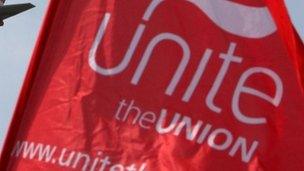Labour: 'No plans' to reopen Falkirk vote-rigging inquiry
- Published

The controversy centres on claims the Unite union tried to fix the selection of a parliamentary candidate
The Labour Party has said it has no plans to reopen its investigation over vote-rigging claims in Falkirk.
It came after a former Labour chancellor added his voice to calls for a new inquiry to be carried out into the allegations.
Alistair Darling said it was clear the original Labour Party inquiry "didn't have all the facts".
But a spokesman for the party said it had "not seen any new evidence to justify further action".
In September, Labour said it had cleared the Unite union of trying to rig the selection process for a parliamentary candidate in Falkirk.
It said the decision was made after "key evidence" was "withdrawn".
Preferred candidate
A Labour Party spokesman on Monday said it had re-interviewed an important witness, Lorraine Kane, following newspaper allegations.
Mrs Kane had told them nothing to justify reopening the inquiry, he said.
Mrs Kane and husband Michael were alleged to have had their memberships of the Labour Party paid for by Unite on the basis that they would support the union's preferred candidate for the seat.
Mr Kane told the BBC on Monday: "I gave statements a while ago and that's it finished with."
Asked if he changed his initial statement to the party, Mr Kane said "No. I never changed nothing."
However, it was not clear whether the statement he was referring to was one in which the original allegations were made, or a subsequent statement which withdrew some of the evidence.
The Labour spokesman added: "Throughout this process we have acted to uphold the integrity of the Labour Party. Throughout this we have said we will look at any new evidence which might justify the reopening of our inquiry.
"That is why the General Secretary of the Labour Party approached Mrs Lorraine Kane today after reports in the Daily Mail. She said today she stands by a sworn affidavit given to us on 2nd September.
"It was that affidavit which was part of the reason that led the Labour Party to conclude there was insufficient evidence to proceed with our inquiry. Therefore we have not seen any new evidence to justify further action.
"There is now a police inquiry going on into other issues around Falkirk and we will of course consider the outcome of that inquiry."
Speaking earlier on Monday, Mr Darling told BBC Scotland he believed something had "gone very wrong in Falkirk" and there "needed to be a thorough investigation".
He said: "I understand the police are looking at it now. If the police decide to proceed they will send a report to the procurator fiscal and then it goes through the criminal justice system.
"If the police for whatever reason decide they are not doing it then there needs to be a proper inquiry, one that people have confidence in, people can see what happened.
"Its results need to be published so that people can see exactly what happened and to make sure this sort of thing doesn't happen again. It has got no place in politics.
"I think the problem with the last report was quite clearly it didn't have all the facts that are now available."
Several Labour councillors in Falkirk have told the BBC that Ed Miliband must now publish the party's report on the affair or re-investigate what happened.
The leader of the Scottish Labour Party had earlier said the inquiry may have to be reopened.
Johann Lamont told the BBC "we certainly have to look at that" because of concerns the investigation "wasn't entirely complete".
But Ms Lamont said there were no plans to make the original inquiry's report public.
At the weekend it was revealed that Stephen Deans, the chairman of Falkirk Labour Party, intended to stand down from his post.
Mr Deans, who had been a full time Unite official at the Grangemouth oil refinery and petrochemical plant, had been accused of being involved in vote-rigging in Falkirk, but was later cleared by Labour's internal investigation.
Johann Lamont: "I am absolutely convinced that when a candidate is selected their focus will be on engaging again with the electorate rather than the process which is currently going on, which is deeply unedifying."
Ms Lamont was asked by presenter Gary Robertson whether she had spoken to Mr Deans.
She responded: "I didn't believe it appropriate for me to speak to Stevie Deans.
"What I am very clear - this is about a situation that is entirely unacceptable for the Labour Party that we have presumed through the selection process that if you can get selected, we presumed that voters will come with us afterwards - that is entirely the wrong message."
Key witnesses
The Sunday Times, external said it had seen 1,000 emails to and from Mr Deans, which it said revealed the full extent of the plot to influence the selection process.
Its story also included extracts of the internal Labour report in which Labour officials said there were "deliberate attempts to frustrate" interviews with some of the key witnesses.
The emails suggested that a letter retracting key evidence in the Labour investigation was not written by the witnesses but by union officials and approved by Mr Deans, according to the Sunday Times.
Police in Scotland, who earlier this year dropped an investigation into the Falkirk allegations, are studying the leaked emails.
- Published3 November 2013
- Published29 October 2013
- Published7 September 2013